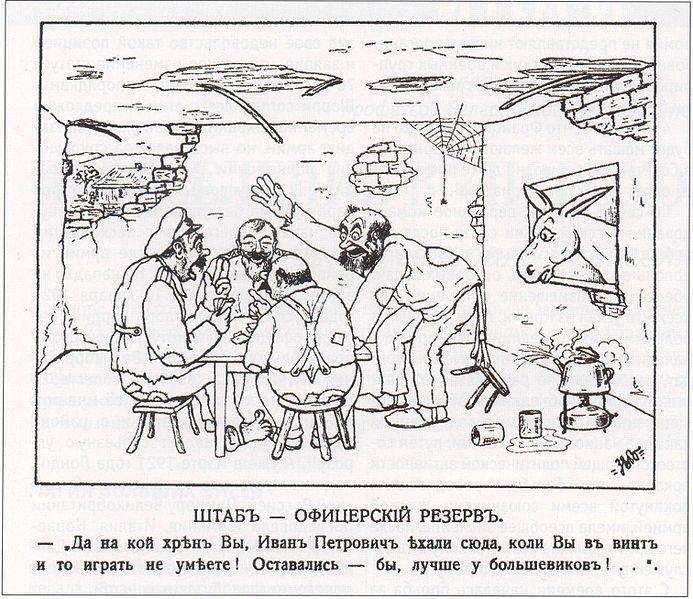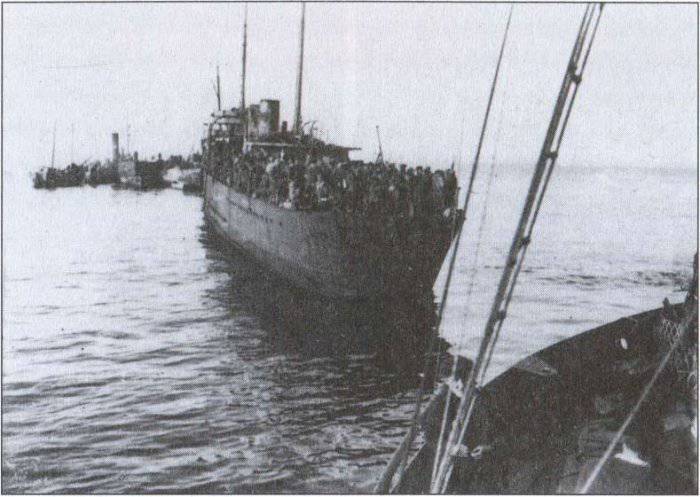About the tragedy of white emigration
The 1917 revolution of the year and the subsequent civil war became a catastrophe of global importance, the centuries-old way of life was destroyed, hundreds of thousands of people were forced to flee Russia. They crossed the border with China, left Vladivostok, crossed new borders with Finland, Estonia, Poland, swam out of the northern, Baltic, Black Sea, Caspian ports. In total, approximately 2 million people left the country. Numerous Russian colonies sprang up in Germany, Poland, Czechoslovakia, in the Balkan countries, in the countries of Latin America, in the USA, Persia, and China. A lot of Russians settled in France and Belgium, there was a restoration of the country after the devastating First World War, there were needed workers.
Moreover, one should not think that all of them became sufferers and blamed the Bolsheviks' power in exile: some of them fled before the horrors of the Civil War, taking away considerable capital in precious metals, jewels, money (capitalists); there is no compassion for the representatives of the "reigning home" - all these "great" princes also did not live in misery, none of them took part in the war with the red, did not shed blood, did not starve. And abroad they organized fights on the topic: “who has more rights on the virtual throne of Russia”. The “political émigrés”, the nationalists, the Bundists, the Socialist-Revolutionaries, the Mensheviks, the Cadets and other representatives of the various “detachments of destruction”, also settled perfectly in the West.
Intelligentsia. Didn't most of the intelligentsia (there were an insignificant number among the right monarchists) were shaking the foundations of the Russian empire, leading the most genuine information war against it - introducing the ideas of atheism, nihilism, anarchism, “progress” ?! Did not the intelligentsia admire the actions of terror, the "feats" of revolutionaries, condemn the "Black Hundreds", the "prison of nations" with shame? It was the intelligentsia who joyfully welcomed the February revolution, the collapse of the monarchy, the arrests of officers, officials, and policemen. It turns out that everything is correct, the one who welcomed the destruction and brought about revolutionary chaos with his actions, then answered with his skin and the fates of his loved ones for his own mistakes. Part of the intelligentsia fled and suffered outside Russia, others drank revolutionary terror in Russia itself. And many did not become smarter, and in the face of death, in the basements of the Cheka, before death, many students and high-school students shouted: “Long live the revolution!”, Until the end they considered themselves the true sons of the revolution.
Most of the nobility can be included in this category (intellectuals) - didn’t their representatives advocated “equality, freedom and fraternity”, supported the liberal parties, many of the nobles became revolutionaries. In the White movement, almost everyone fought for these “democratic values”; there were extremely few monarchists there, a very small percentage. The Bolshevik propaganda was lying, saying that the people are "being prepared for the throne." They also answered for their revolutionary aspirations, they wanted a revolution - they got it, they broke the old order of things, and the new one came out completely different. Not the way you dreamed of, “sweet France or Holland” from Russia did not work. A new global project is approved - Red.
Many who escaped from Russia did indeed live in misery - people with higher education, sometimes knowing several languages, some of noble origin or having military merit became laborers, taxi drivers, dishwashers, aristocrats sold their bodies. But many of them could have found a new life in Soviet Russia: the Reds took military specialists with pleasure, needed scientists, teachers, in the era of eradicating illiteracy many of the emigrants could become teachers, honestly earn their own bread. In addition, few people fought with the Bolsheviks, at best one out of twenty, the majority did nothing to help the White movement, from the side watching the war. Yes, and criticizing whites for the "dictatorship", the oppression of "freedoms", the wrong actions.
Almost all of them were infected with Westernism, bowed before him, dreamed of "progress." So they drank the full measure of "progress" and Western "freedoms". They dreamed of living as in the West, and they got what they wanted. Only in the West were their aristocrats, their bourgeoisie, their officers, the new ones were out of place, therefore they ended up at the bottom of society.
A peculiarity of “white emigration” was the extreme politicization of those who fled, they immediately split into groups, from monarchical (also without unity — they supported various “princes”) to anarchists and Trotskyists, there was no single anti-Bolshevik front. Only in France there were more 300 organizations of Russian migrants. In addition, the Russians did not create “diasporas” -communities, they quickly assimilated, already in the second or third generation, having forgotten the Russian language, Russian culture, becoming Americans, Australians, French, and so on.
So, the monarchists created the Supreme Monarchical Council, it immediately fell apart into supporters of France and Germany, into supporters of the “great” princes - Kirill Vladimirovich and Nikolai Nikolayevich. Socialist revolutionaries (SRs) were divided into 7 groups. Even there were two metropolitans - the church was unable to maintain unity: Eulogius was approved by Patriarch Tikhon from Russia. In 1922, in Serbia, the Council of foreign bishops who did not recognize the Moscow Patriarchate elected Metropolitan Anthony, the so-called Russian Orthodox Church abroad was created.
Of the well-established ones, Russian industrialists, merchants and bankers could be noted, they created their own organization — Torgprom (Tereshchenko, Nobel, Ryabushinsky, and others); they began to invest in Western business. Diplomats, who had considerable sums at their disposal, created the Council of Ambassadors. Liberals even created new Russian Masonic lodges: "Northern Lights", "Northern Brotherhood", "Northern Star". Military organizations were also created: the Wrangel Russian Army (it was evacuated from the Crimea to Turkey, then to the Aegean Islands, later settled in Serbia and Bulgaria); “The Brotherhood of Russian Truth” by P. Krasnov, S. Paleolog, A. Leven - they were guided by Germany; in North China there were two groups - one focused on Japan (ataman Semenov), the other on the local Chinese ruler Zhang Zolin (generals Horvat and Dieterichs); another cent originated in Poland - Savinkov and General Peremikin. In addition, there were still Cossack, Ukrainian, North Caucasian, Armenian, Azerbaijani, Central Asian groups, groups.
There was no unity, everyone constantly vied with each other, “fought”, intrigued, quarreled, shared, created temporary alliances. So, the Ukrainian nationalists have different groups focused on different Western powers. True, at first, almost everyone believed that the Bolshevik government was short-lived, some believed that Russia would repeat the fate of revolutionary France, others believed in an uprising of the people that would overthrow Bolshevism, and others relied on a war with some Western power.
Initially, part of the migration tried to preserve their potential, they considered themselves “elite”, bearers of the spiritual, cultural, state traditions of Russia, so that, if Soviet Russia now does not think to die, later still bring the “old Russia” of new Russia. The Russian All-Military Union was created to preserve the military traditions of the Russian army, Higher military-scientific courses were opened in Paris, gymnasiums, cadet corps, scientific societies were created. New philosophical theories have appeared - “Eurasians”, “Smenovekhovtsev” and others. Organizations of writers, lawyers, journalists, artists, historians, and more. others.
It is a pity that these people did not raise the question - is it necessary whether the “old Russia”, the future Russia? With its deep-seated mistakes that led to the collapse of the Russian empire ... And current politicians, philosophers, writers, clergymen and other figures who are trying to introduce idealized ideas about the Russian empire, the White movement, white emigration into modern Russia lay a new mine , Which will again lead to chaos and hundreds of thousands of victims, broken lives.

A caricature of the white officers of the year 1921.

Information